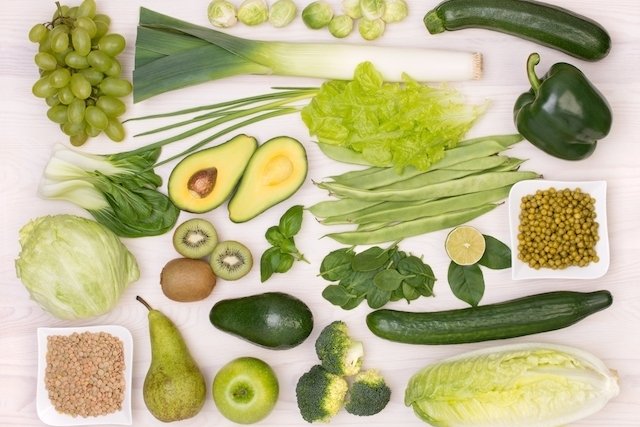Vitamin K is a fat-soluble vitamin essential for several functions, such as participating in the blood clotting process, preventing bleeding, and stimulating the fixation of calcium in bones, being important for strengthening bones and preventing osteoporosis.
The main form of vitamin K is vitamin K1, or phylloquinone, which is found in dark green vegetables, such as broccoli, kale and spinach, and fruits, such as kiwi, strawberries and grapes. Vitamin K2, or menaquinone, is produced by the intestinal microbiota and is present in some foods of animal origin.
Read too: Vitamin K2: what it is for, rich foods (and when to take it)
tuasaude.com/vitamina-k2
In addition to being found in food, vitamin K can also be obtained in the form of supplements in capsules, tablets or in the form of injections, which should only be used under the guidance of a doctor or nutritionist.

What is it for
Vitamin K is essential for the body as it performs the following functions:
1. Act on blood clotting
Vitamin K is necessary to form proteins that help control bleeding, which are important for blood clotting, preventing bleeding and promoting wound healing.
2. Maintain bone health
Vitamin K maintains bone health as it is necessary for the production of osteocalcin, a bone matrix protein that stimulates the fixation of calcium in bones.
Thus, vitamin K promotes normal bone development and its maintenance into adulthood, helping to prevent the development of osteoporosis.
For vitamin K to contribute to improving bone mass, it is essential to maintain a good intake of calcium in the diet. Check out foods rich in calcium.
3. Prevent bleeding in the newborn
Newborns have a low reserve of this vitamin, presenting a high risk of bleeding due to vitamin K deficiency.
Therefore, as a preventive measure, all newborn babies should receive two oral doses of 2 mg of vitamin K, one on the first and the other on the seventh day of life, or a single intramuscular dose of 1 mg of vitamin K.
4. Promote cardiovascular health
Vitamin K is involved in the production of proteins that help prevent calcification or hardening of the heart arteries, which could prevent the development of heart diseases such as atherosclerosis and myocardial infarction.
However, more studies are still needed to determine the specific amount of vitamin K needed to help prevent cardiovascular disease.
Foods rich in vitamin K
The main foods rich in vitamin K are:
- Dark green vegetables, such as broccoli, kale, watercress, lettuce and spinach;
- They also;
- Oil;
- Natto.
- Avocado;
- Boiled egg;
- Liver;
- Kiwi;
- Raw carrot;
- Cabbage.
In addition to these foods, vitamin K is also found in nuts, chestnuts, pistachios, meat, cheese and soybeans. Discover other foods rich in vitamin K.
Recommended daily amount
The recommended daily amount of vitamin K varies according to age, as shown in the following table:
Additionally, pregnant or breastfeeding women up to the age of 18 need to consume 75 mcg of vitamin K per day. Women who are pregnant or breastfeeding and aged 19 to 50 need to ingest 90 mcg of vitamin K daily.
Lack of vitamin K
A lack of vitamin K is rare, as this vitamin is present in many foods and is also produced by healthy intestinal flora.
However, newborns, people undergoing chemotherapy or dialysis, who have undergone bariatric surgery, with diseases such as celiac disease or Crohn’s disease, and who take antibiotics, anticonvulsants or medicines to reduce the absorption of fats in the intestine, have greater risk of having vitamin K deficiency.
The symptoms and signs of a lack of vitamin K are bleeding from the skin, nose and gums, longer menstrual periods or excessive bleeding.
Vitamin K deficiency can be confirmed by the doctor by evaluating symptoms and a blood test to assess prothrombin time, platelet count and clotting factors, for example.
Excess vitamin K
Vitamin K obtained from food has no toxic effects. However, excess vitamin K in the form of supplements can cause yellowing of the skin and eyes, hemolytic anemia, increased bilirubin in the blood, and kernicterus in infants, a type of brain damage that causes cerebral palsy and/or hearing loss, for example. example.
Read too: Kernicterus: what it is, symptoms and treatment
tuasaude.com/kernicterus
When to use supplements
Vitamin K supplements can be prescribed for newborn babies and people who are deficient in this vitamin.
Vitamin K supplements are sold in tablets or capsules, in pharmacies and supplement stores, in the forms of vitamin K1 or vitamin K2.
Read too: Vitamin K2: what it is for, rich foods (and when to take it)
tuasaude.com/vitamina-k2
These supplements are generally found in dosages of 2 to 500 mcg, but the recommended dose varies depending on the person’s age and goals. Furthermore, some medications may interact with this supplement, increasing or decreasing its effect. Therefore, this supplement should only be used under the guidance of a doctor or nutritionist.
Injectable Vitamin K
Injectable vitamin K can be recommended, in a single dose of 1 mg for newborn babies, to reduce the risk of bleeding.
In addition, injectable vitamin K can also be prescribed by a doctor to treat deficiencies of this vitamin in adults.

Sign up for our newsletter and stay up to date with exclusive news
that can transform your routine!
Warning: Undefined array key "title" in /home/storelat/public_html/wp-content/plugins/link-whisper-premium/templates/frontend/related-posts.php on line 12
Warning: Undefined array key "title_tag" in /home/storelat/public_html/wp-content/plugins/link-whisper-premium/templates/frontend/related-posts.php on line 13



